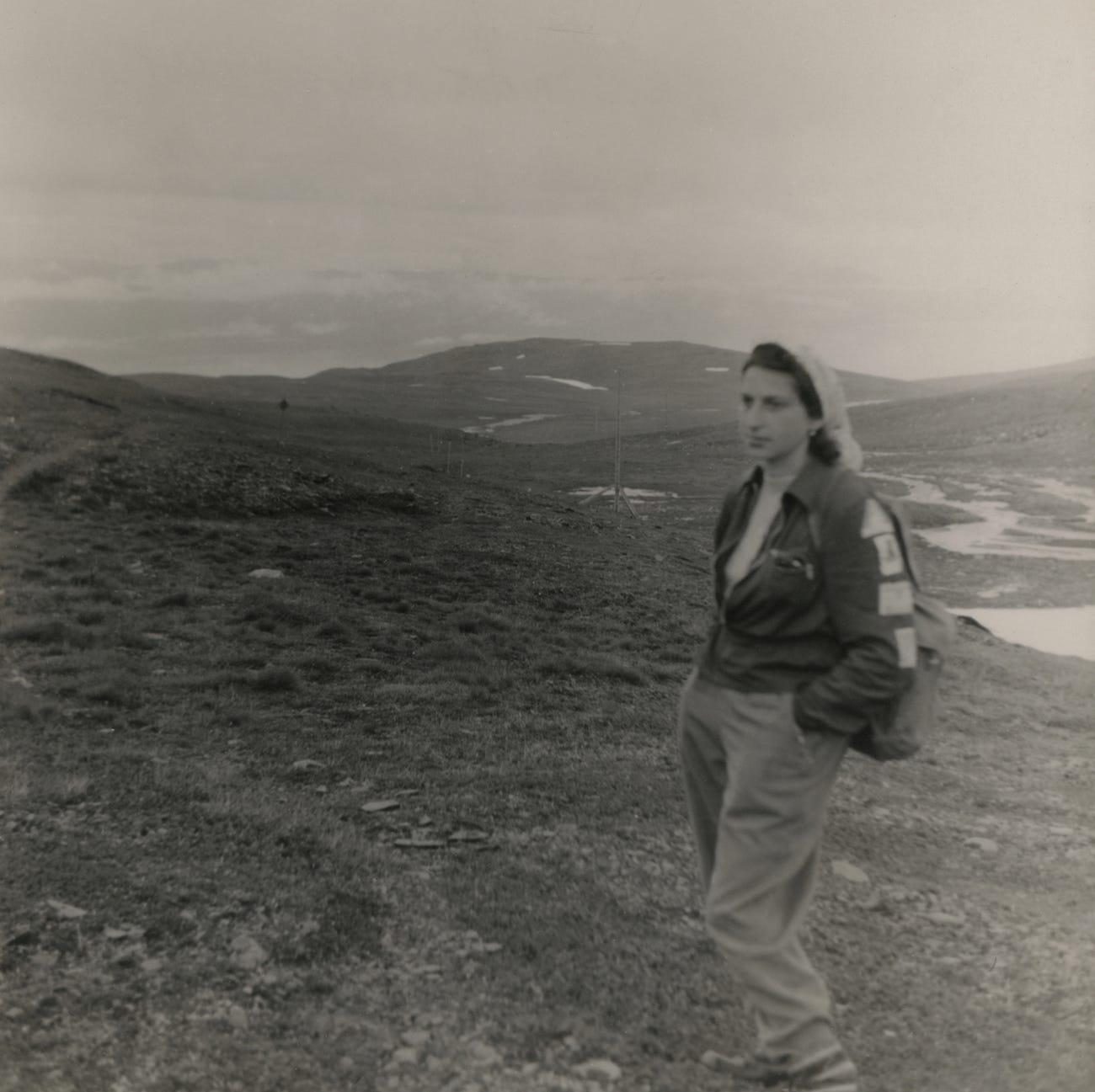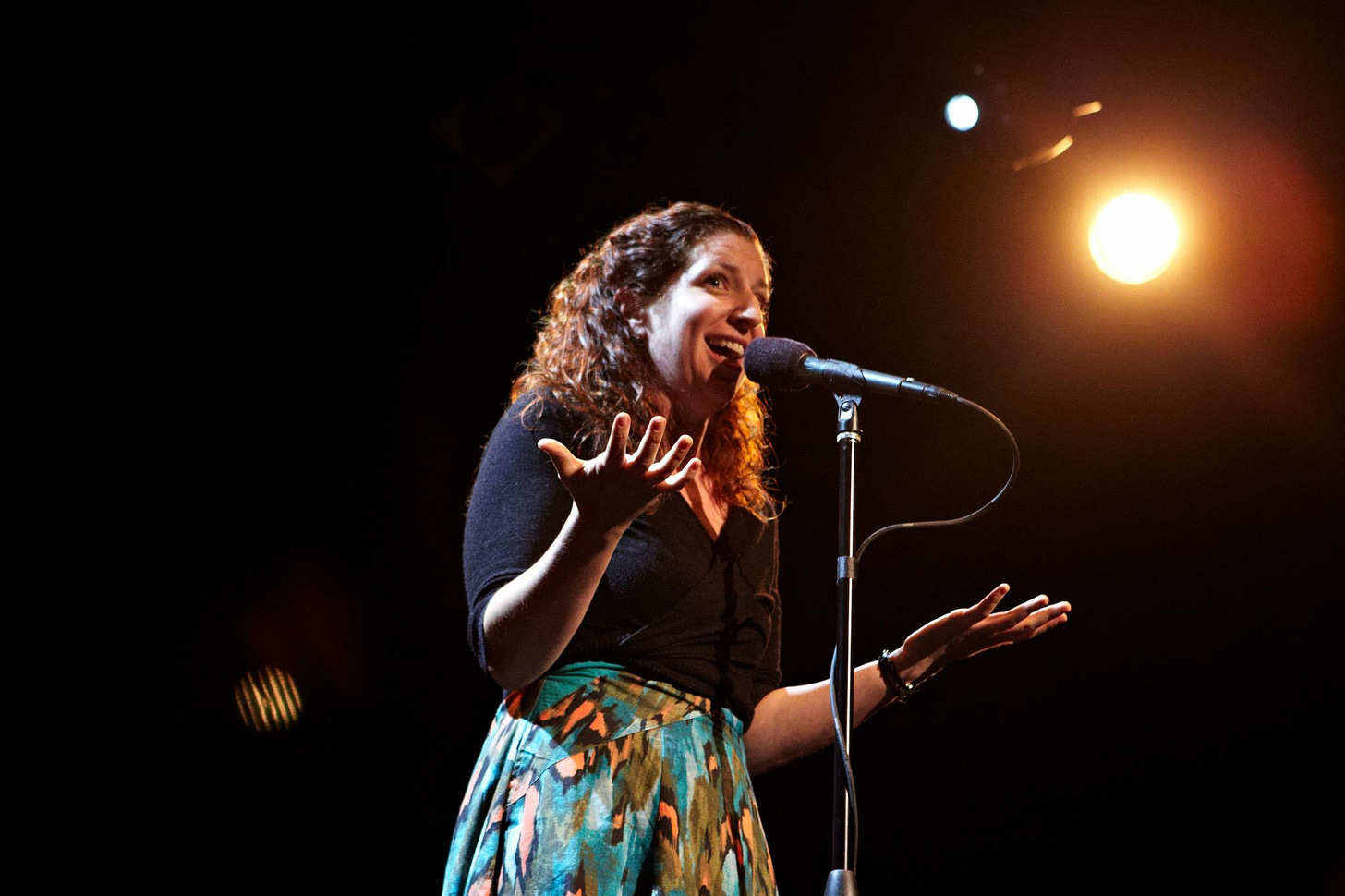A Postcard From Back Then
My grandmother’s bathroom door was filled with postcards. They covered the door completely, like a wallpaper of correspondence. The one that I remember with most clarity was a photograph of a woman playing tennis in the nude. She was wearing nothing but shoes, and behind her there was a sign that read “sneakers only.” That image still captures part of my grandmother to me. Not because she was naked all the time, although there are plenty of pictures of her to suggest she liked to be. But rather, that postcard showed her dislike of rules, particularly the arbitrary ones, and her appreciation of some good word play.
It was her downstairs bathroom that was so adorned — a half bath. It was a small room with a toilet and a sink and it was impossible to not look at the door. The postcards marked her travels and adventures. The places she’d been throughout her life. Or, I guess, the places her friends had been. If I’m being honest, I never saw the back of the postcards so I don’t know if they were hers or sent to her. Either way, these postcards were the first narrative I had of my grandmother. She would go anywhere and had been everywhere.

I recently had the chance to sit with Micaela Blei for ALONG THE SEAM. You can listen to that episode here. Micaela is a neighbor of mine and a fellow pandemic transplant to Maine. She has one of those personalities that draws you in with a natural dynamism, which makes sense considering she has a PhD in storytelling and is a two-time Moth GrandSlam champion. (Here is one of my favorite stories she tells on The Moth stage). Micaela is one of those storytellers that helps bring the good memories back. Whether intentional or not, she helps you zoom out and see that life feels different if we let ourselves tell our own stories in a heartening way.
When we first met, we bonded over the fact that both of our grandmothers were Czech Holocaust survivors. It’s not that we felt like we needed to talk about it or process anything together, it was just that we recognized one another. We inherited a similar type of complicated heaviness from our family history, and also were given the zest for life that so many survivors find for themselves within the healing process.
Micaela described her grandmother, Ila Moss, as glamorous, and as a “dish.” She always had her red hair done up and her red lipstick on. She had real world intelligence, but also knew how to pose for a picture. And, she had an addiction to chocolate. Ila died shortly before her 90th birthday, but had she not, Micaela would have joined her on a senior singles cruise. “The question was who is going to go with her?” Micaela told me. "Everyone else had families. No one else could get away to do it. And I was like, that's me. I'm going with her on a senior singles cruise. And I was like, this is all I want in life is to go on a senior singles cruise with my 90-year-old dish of a grandmother…”
But behind all of that, many decades before, Ila had one of those unimaginable Holocaust survival stories. She was sent to Auschwitz while pregnant and somehow gave birth within the confines of that infamous fence. And, it’s very likely the baby didn’t survive. That fact was never confirmed though and that hidden pregnancy carried to term has created a type of memory in Micaela’s family that lives as an unknown. It's an unimaginable story. A dark shadow wrapped in nonfiction. I don’t know this because Micaela and I talked about it — we didn’t. I know this because Micaela beautifully told this story on a podcast called Family Ghosts.
I told Micaela that I listened to the episode as part of my research before I interviewed her, but also admitted that I didn’t really want to listen. “I have a hard time admitting this out loud,” I shared. “I really don't like listening to Holocaust stories. I have a really hard time with them. Either I find myself being a little bit too critical, or I just get exhausted.” She told me she knew what I meant and I felt relieved to be understood.
And then I told her that I was wrong in being skeptical of listening. I loved her story. I needed her story. Micaela’s sensitive interrogation of her own family’s past was told in context of her own questions about the course of her life. Her family ghost story wasn’t about burdening the present with the traumas of the Holocaust. It wasn’t about harnessing fear or finding excuses for the pain and destruction we observe and witness in the world right now. This story of a grandmother, told by the masterful storyteller who is her granddaughter, was about wondering if she wanted to have kids herself. The story touched me deeply, but not because I’m also the granddaughter of a badass Czech Holocaust survivor. I was moved because I’m a 35-year-old woman asking myself the same questions.
My memories in my grandmother’s home — the one with all the postcards — are filled with children. The adjectives I would use are joy, play, fun, silly, and high energy. All things I need more of in my life. We seven cousins, all relatively close in age, would bounce off the walls with each other. We created chaos and it was the best time almost all the time.
There were the Passover meals where we dressed up to perform the story told at seder. I remember us destroying the living room to create a landscape of pillows and blankets across the floor. We made disgusting concoctions for my grandmother to drink (I describe that on the first episode of We Share The Same Sky). There were group Hanukkah gifts. I remember one year I bought Batman tank tops for everyone (pictured below). There was so much to look at in her home and so much to try to avoid breaking. There were books with old bindings, a glass coffee table, precious stemware, the lone computer that we would fight over so we could play Pong, and the collection of paperweights that I now imagine must have held down her heavy memories. I wouldn’t pick those up and see what came before all of us until after she died. My grandmother’s home was where I was bullied by my older cousins and had to practice holding my own. It’s where I learned how to make palačinky and knedlíky — foods that would connect me, even if just slightly — to the Czech people. It’s where similarities and differences in our immediate family structures and religious affiliations were amplified. It was the home where choices of lifestyle and language were vibrant and evident.

My cousins and I all stayed close throughout college. We learned how to drink together and how to travel. We went to school together in both Philadelphia and Israel. We celebrated holidays without our parents forcing us to. Many of us got engaged and married around the same time. And then life for me diverged when I was widowed young and had to grieve. My cousins each went on their own journeys and started having kids and building their families. I stayed away during this time. It was too hard to be together. The absence of my person didn’t feel as bad when I was by myself.
Now, years into my own healing and well into a different chapter of life, I’m craving the company and the familiarity of childhood. I’m remembering fondly when my grandmother would chase us around her house with her outstretched pointer finger threatening to poke us in the stomach as we shrieked and ran away. I’m full of questions and feelings these days about what it means for our family that my brother and I are the only two cousins who don’t yet have kids of our own.
My grandmother’s house is owned by my aunt now and is again filled with grandchildren. All the young people that call her safta (grandmother in Hebrew) are related to me, but I don’t know any of them. I imagine a similar scene playing out as when we were kids though. The cousins getting together, crying from both frustration and laughter. I imagine traditions and rituals laying the foundation of their childhood memories. Differences and similarities in parenting styles amplified. I know that the laundry room door to the backyard has been replaced by a big wall-sized sliding door. The newspapers have been replaced by personal computers. The worries of today are a bit different, but also a bit the same as back then. Holidays and birthdays have been celebrated. Relationships with new in-laws have been formed. But mostly, I imagine that there is a lot of joy. I imagine there is a lot of play. It sounds like it might be a lot of fun. It sounds like something I might want.
A prompt for you, the reader, that can be done in written or visual form:
In my conversation with Micaela, she talks about “mining our own memories” and the importance of small moments as a space of human connection. She also talks about secretly recording her grandmother’s voice and filming her home in the year or so before she died. This essay was inspired by that admission. I’ve always used pictures and videos to write from. They are vital for me to recount the crevices and the details I miss in real time.
The Visual Prompt: Take your phone (or a *real* camera) and film a room or an entire home you love. Timestamp what it looks like. Pause on the little details that you might typically pass by. Note the art. Note any mess. Any piles of paper. Document the details.
The Written Prompt: Describe a house that is filled with memories. Pay specific attention to what you remember visually. What books filled the shelves? Do you remember wallpaper or a certain scratchy blanket that lived on the couch? Who filled the home. Was it family? A best friend? A neighbor? Make sure to write in the first person and don’t get caught up if you can’t remember. The blurriness of our memories has just as much value as anything that feels clear.




